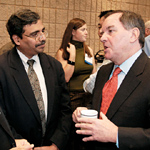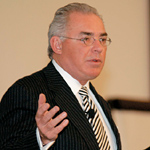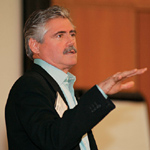| |
 |
| |
|
| |
|
| |
 |
| |
C.
Steven McMillan, chairman, president and CEO of Sara
Lee Corp. McMillan |
| |
|
| |
 |
| |
Bryan
C. Cressey, managing director of Thoma Cressey Equity
Partners
All photos
©2003 Nathan Mandell |
| |
|
Student
conferences keep delivering excellence
Innovation
and leadership on display at Kellogg School student conferences
by
Kari Richardson & Matt Golosinski
Cell phones,
instant messaging, wireless Internet access, data marts and
video conferencing. Despite the high-profile failures of many
dot-coms, these technologies and more have quietly shaped
the inner workings of business, government and education,
and continue to do so, said industry leaders at the Kellogg
School of Management’s Digital Frontier Conference.
The conference,
held Jan. 17 and 18 at the James L. Allen Center, featured
two dozen panelists with expertise in high-tech business,
as well as keynote addresses by Chicago Mayor Richard M. Daley,
Google CEO Dr. Eric Schmidt, Mark Hurd, president and COO
of Teradata, and former Napster CEO Hank Barry. Kellogg students
organized the ninth annual conference, themed “Technology
Means Business,” to bring together industry leaders,
executives, alumni, students and faculty.
“The
press says that the dot-com boom is over, that the Internet
is dead,” said Schmidt, CEO of Internet search firm
Google. “All these obnoxious young people are going
to go back into hiding. The movement is over. What’s
interesting is that there are roughly 100 million homes that
claim to have Internet access.”
Mayor
Daley (top photo) said technology continues to transform the
way the City of Chicago operates, whether it’s by allowing
workers to track roadway improvement projects, or make essential
information available to citizens online.
While
other locales have suffered as a result of over-reliance on
one or two industries, Chicago has combined its strong manufacturing
base with strengths in the service industry, as well as a
growing technology sector, Daley said.
Schmidt
said Google, launched well after Yahoo and the now-defunct
Excite, managed to become a leading search engine, in part,
by remaining a private company while other e-businesses scrambled
to go public.
“Access
to information is not a trivialissue,” said Schmidt,
adding that Google gets hundreds of thank-you letters each
year, including notes from people who used the site to find
missing children or research the symptoms of heart attack,
getting them to the hospital sooner.
Information
and innovation were also among the topics at the sixth annual
Kellogg
marketing conference, where marketing executives emphasized
the need for constant innovation to create products that appeal
to new and existing customers. Titled “Marketing as
a Sustainable Competitive Advantage,” the Jan. 29 event
attracted hundreds of participants, including Kellogg School
alumni, students, faculty and corporate leaders.
“If
you focus only on what you can make versus what the customer
wants, you’re in trouble,” said keynote speaker
C. Steven McMillan, chairman, president and CEO of Sara Lee
Corp. McMillan said Sara Lee developed a culture of change
to stay competitive, making hard decisions to sell off 19
businesses within a year to realign its portfolio, and changing
management compensation methods to spur innovation.
Other
keynotes at the conference were Target Corp. President Gregg
Steinhafel and Anne Nelson, senior vice president and chief
marketing officer for Ameritrade Holding Corp.
Panel
discussions addressed new product innovation in the consumer
packaged goods sector, as well as sports and pharmaceuticals
marketing, and how to leverage the latest technology to gain
market leadership in the entertainment industry.
The fourth
annual Kellogg Private
Equity Conference, with its theme of “The Road Ahead,”
took place Feb. 19.
With more
than 30 speakers from leading venture capital and buy-out
firms, the event built on the success of the 2002 conference,
which drew some 450 attendees, including principal investors,
entrepreneurs, senior executives and Kellogg alumni, faculty
and students. Conference keynotes included Bryan C. Cressey,
managing director of Thoma Cressey Equity Partners, and T.
Bondurant French, CEO of Adams Street Partners. The conference
focused on how the private equity industry would emerge from
one of the most turbulent economic periods in history.
|



